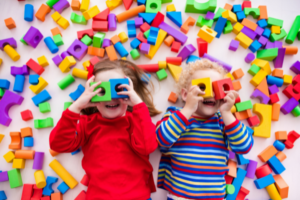Parenting NI supports parents to understand the value of play by modelling techniques and positive behaviour. Play encourages and provides the opportunity to learn whilst experiencing fun and growing friendships and bonds.
- Social Skills – Cooperating during play is the first step in making friends. Play teaches socialization skills such as sharing, taking turns, self-discipline. Playing within a group teaches teamwork, understanding rules and being willing to follow them. Sometimes they also like and need to play alone.
- Emotions – Children learn how to handle losing and winning and can act out a range of emotions. They also learn how to manage conflict.
- Language – Everyday words, naming emotions – “you seem annoyed someone knocked your bricks down”. Communication and social language like ‘please’ and ‘thank you’. Through play, children learn about the world they live in, for example role play in playing house or shops or mummy and daddy.
- Creative Play – Creative play involves children exploring and using their bodies and materials to make and do things and to share their feelings, ideas and thoughts. They also learn to use their imagination, like playing schools, doctors and nurses, cartoon characters and super heroes and animals.
- Fine and gross motor skills. A motor skill is an action that involves the movement of muscles in your body. Gross motor skills are larger movements involving the arm, leg, or feet muscles or the entire body — things like crawling, running, and jumping. Fine motor skills are those smaller actions like picking things up between the thumb and finger for pre writing skills or using the toes to wriggle into sand or the lips and tongue to taste and feel objects. Children develop their co–ordination, balance, strength and stamina from physical play.
- Care of animals and the environment – pets can be invaluable at teaching families, especially children, “emotional intelligence,” a measure of empathy and the ability to understand and connect with others.
- Rules – Playing games comes with rules and boundaries. Boundaries work far better if they are made and agreed by everyone. So if children understand the need for rules and see the sense of it, or know you’ve taken their opinions into account, they are more motivated to cooperate. And play well together.
- What is Play – Play is a way of ‘doing things’ Play helps children to explore the unknown. The pretend element offers a safety net that encourages children to safely take risks.
- To have fun – Children often play simply for fun and enjoyment. They bring their own interpretations of situations, events, experiences, and expectations to their play



